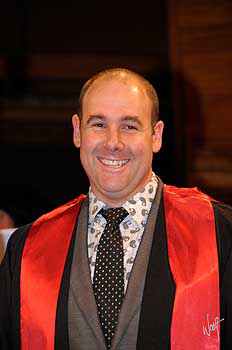Overweight and anxious – how the fat industry works

Few business PhDs quote from personal diary entries, but Dr Andrew Dickson’s thesis is unashamedly based on his own experience of being overweight and anxious. At the same time, it looks at how the weight-loss industry feeds off, and profits from, people’s “weight anxiety”.
“I was very interested in how weight-loss consumers interact unconsciously with the industry so I took a pyschoanalytical approach in my thesis,” says the Massey University PhD graduate.
“I was 130kg, but I was a well-loved, active member of society and, I would say, even relatively fit. But the consistent and droning message I received was that I must lose weight.
“The industry constantly tells fat people that their bodies are wrong. You are undisciplined if you aren’t trying to lose weight. You aren’t allowed to say, ‘I’m fat and I’m okay with that’. So, like a good citizen, I did as I was told and I was not okay with my body.”
Dr Dickson outlines what happened next in his thesis introduction. He lost 40kg over four months after a doctor prescribed him the appetite suppressant Reductil, which is no longer available in New Zealand. He says the experience was “exhilarating – so intense it couldn’t be real”.
But getting down to 85kg didn’t reduce his anxiety levels. “When I was at my lowest weight I was a vegetarian teetotaller, living off the diet of an elderly lady, and running all the time. I was still anxious about every fluctuation in my weight, and I certainly wasn’t happy.”
Dr Dickson says promoting weight loss is big business, and the industry trades not only in consumer products, but also in people’s weight anxiety. This is an important concept, he says, because the anxiety continues to exist even when people have lost weight because they begin to fear weight gain.
For others like him, Dr Dickson advises trying to minimise contact with the weight-loss industry. “If you’re anxious and think you need to lose weight to be happy, seek help from a therapist. A good analyst will explore what being happy actually means for you, and will help you disassociate your happiness from your weight.”
The process of writing the thesis has been a personal journey for Dr Dickson. He started out with the intention of looking at weight loss in a positive light but, as his research progressed, he had less time for exercise and his weight and anxiety levels increased. “I began to see how I was internalising the messages of the weight-loss industry,” he says.
These days Dr Dickson says he has developed a more comfortable relationship with his anxiety. “I don’t weigh myself anymore because it’s not good for me, and I try to be a bit more celebratory about my size. For example, I will try and set up a ‘Clydesdale category’ in any running events I participate in so all of us who are more than 100kg can enjoy the experience together.”
He has also had a lot more than his weight to focus on recently – the birth of a second child, his graduation, and a move to Palmerston North to take up a new job as a lecturer in Massey University’s School of Management.
He will teach papers in leadership, entrepreneurship, and organisational change, and he is looking forward to getting his students to think critically about the world of business.